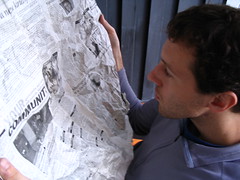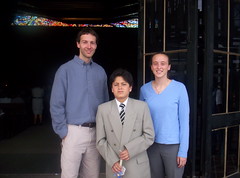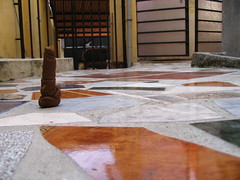Crumpled Newspapers
Eileen�s parents were kind enough to put together a little care package for us in the form of an extra suitcase sent along with Eileen�s friend Joni. It was packed with clif bars, vitamin water, xbox magazines (bathroom reading), livestrong bracelets (gifts for my students), a couple of birthday presents for me (I made a list for those of you who want to get me a little something), and a bunch of newspapers for padding. It was like Christmas morning, opening up the suitcase. Today, we just finished packing it up with things we don�t need for the next couple of months. We�re a little worried that it�s going to be hard to get everything home in July.
Yesterday, I read several of the crumpled Madison newspapers. And I got a little foreshadowing of how a complete understanding of the language I�m living in will be annoying. Right now, I�m comfortably ignorant of the daily idiocy that appears in local newspapers.
I was first lured in by a headline that read, �Lure of CDs snared terror fugitive.� About a third of the way through the piece, I read, �They burn and break in by night, melt into the mainstream by day. They work alone or in tiny cells motivated not by profit but by passion. The Animal Liberation Front . . .� Wait. What? The Animal Liberation Front? Tell me something. Prior to September 11th, would The Cap Times have used the same ridiculous rhetoric in their headline? Terror, huh?
Good grief.
I decided to move on to some local education issues. The first thing to catch my eye was a very compelling headline from the May 16th Cap Times: �Be yourself, graduates told.� That�s front page news? A clich�d, ho-hum commencement speech? No need to read that article.
I uncrumpled a �Metro� section which had an article written by a friend of mine, Lee Sensenbrenner, about the school referendums. I�ve been out of the loop on the issue, so I read it. Unfortunately, the names I read there brought back my worst memories of my teaching career — the career I�m returning to.
I turned to the Lifestyle section next. It had an article entitled �Why we need good English.� I figured maybe the piece would make me feel more appreciated, so I read on. Ironically, the writing was at about 6th-grade level. And it quoted Barbara Coonradt, of Albany, N.Y., who said, �When people speak or write improperly, I immediately view them as not very intelligent. While I realize that my perception may be incorrect, it�s hard for me to forgive the misuse of English when proper usage is something most people can learn easily.�
Barbara, listen to me. I�ve spent the past year trying to teach people how to speak any form of intelligible English. And prior to that, I spent five years trying to teach people some things about �proper English usage.� It�s NOT easy to learn. Have you ever been to a country where you didn�t speak the language, Barbara? How many languages do you speak other than English? If someone had grown up in a culture where �proper English� was not the language, would you still contend that �proper English� is easy to learn? (I�m not just talking about foreign-born people.)
Barbara, I know the difference between lie and lay. I know the difference between effect and affect. I know that in the sentence, �It is I,� I is the predicate nominative and thus should be in the subjective case. Barbara, I�m sure I could kick your proper usage ass in a grammar bee. And I�m telling you as a teacher of English that it is not an easy thing to master.
Good Lord. What�s really scary is that there�s a 90% chance that this idiotic article got posted on the bulletin board in the English department at West.
No wonder I never read the local newspapers.
The real �terror fugitive� in all this is the career I�m going back to. I�m terrorized by the thought of returning to the likes of Joan Knoebel and people like Barbara Coonradt. I console myself with the knowledge that Madison is not a town full of idiots, and that there�s lots to love.



